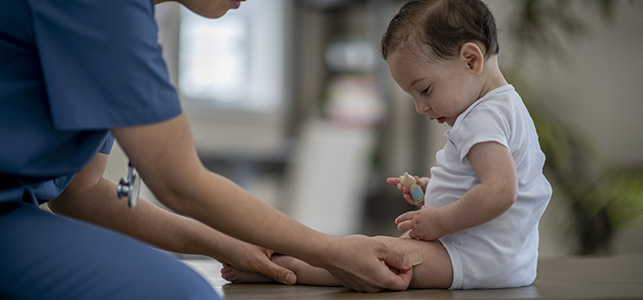
A pediatrician answers 5 quick questions about RSV and kids
‘Tis the season for respiratory viruses. In addition to rhinovirus (primarily causing the common cold) and flu, RSV in particular is on the rise among kids. Last week, 26 percent of pediatric RSV tests given at CHoR were positive.
Pediatrician Dr. Tiffany Kimbrough explains what RSV is and how we can slow its spread
What is RSV?
Respiratory syncytial virus, or RSV, is a common virus that causes infections of the lungs and respiratory tract. It spreads very easily when virus droplets get into the eyes, nose or mouth. This can happen when breathing in droplets from an infected person’s cough/sneeze, through direct contact such as kissing an infected person, or by touching a surface (doorknob, light switch, counter, etc.) with the virus on it then touching your face.
What are the RSV symptoms to watch for?
RSV symptoms usually last 1-2 weeks, peaking on days three through five. They’re typically similar to those of a common cold:
- Congestion
- Cough
- Fever
- Headache
- Loss of appetite
- Runny nose
- Sore throat
- Tiredness
- Wheezing
While RSV is usually mild, it can become serious and lead to bronchiolitis (inflammation of the small airways in the lungs) or pneumonia. If your child has a fever above 100.4˚ F and is under 3 months old, is not urinating regularly (fewer than three wet diapers in a 24 hour period or fewer than one wet diaper every 8 hours, or using the bathroom less than once per day in older children) or is having trouble breathing (nostrils flaring, high-pitched whistling sound when breathing, pulling under or between the ribs, fast breathing), seek medical care.
Do I need to keep my kid home from daycare or school if they have RSV?
Because RSV is so contagious, if you know your child has it you should keep them home. The general rule of thumb with any illness is to stay home until symptoms (like coughing and sneezing, which spread germs easily) are improving and there is no fever for 24 hours without the assistance of fever-reducing medication. Schools and daycare centers have sick policies, so check those too before allowing your kiddo to return.
What if my child tests positive for RSV before a holiday gathering?
The same “rules” we recommend for school and daycare would apply for any type of gathering. Infants and older adults are at increased risk for developing severe RSV illness, so extra caution should be taken if they’re part of your holiday plans. Unfortunately, the holiday season coincides with the ramping up of respiratory virus season. No one wants to miss out on holiday fun, but it’s better to be safe and postpone celebrations until everyone is healthy.
How can I protect my family from RSV?
We’re offering a new RSV vaccine this year for babies younger than 8 months. It offers six months’ worth of protection, which will get your little one through the winter. Older kids generally do not get severe symptoms from RSV, but if your older child has a chronic or complex medical condition, check with their doctor to see if the RSV vaccine is appropriate for them.
People of all ages should continue with the standard infection prevention measures, including washing hands frequently and thoroughly, getting the flu and COVID vaccines, receiving all childhood immunizations on schedule and staying away from others when ill.
